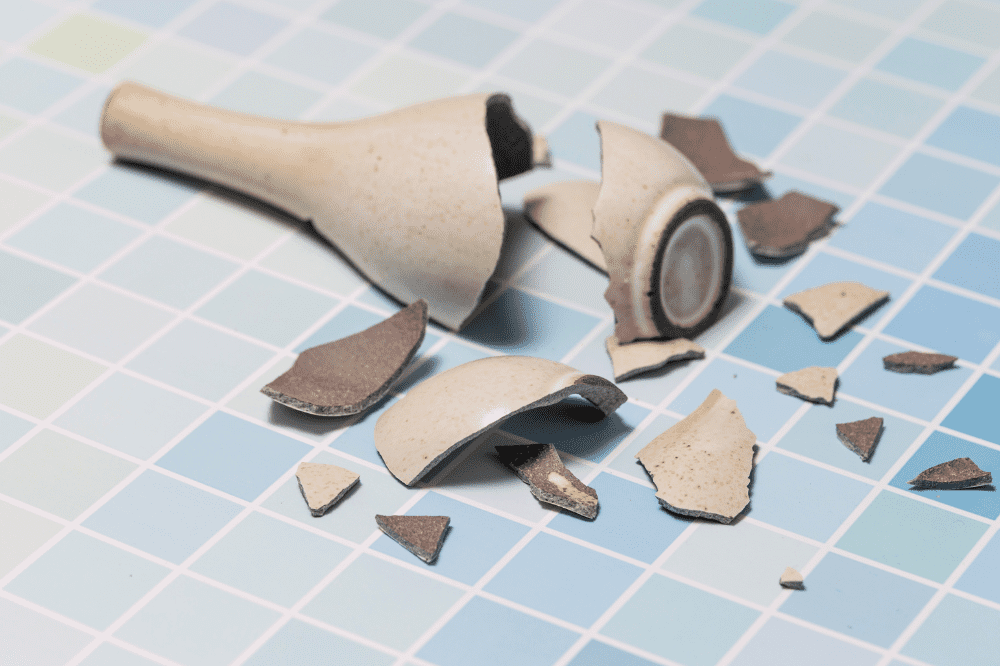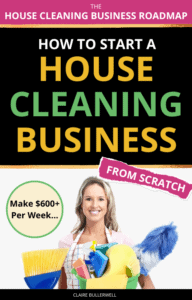As a self-employed cleaner, you have enough to worry about without having to stress about potential risks and accidents on the job.
While cleaning may seem like a low-risk occupation, accidents can happen, and the costs associated with them can add up quickly. That’s why it’s so important to have self-employed cleaner insurance to protect yourself and your business.

So let’s answer your question straight away – “What insurance do I need as a self employed cleaner?”
There are two main types of insurance which a self-employed house cleaner can take out. The first is Liability Insurance to cover for any breakages, damage to property or injury to yourself or your clients. The second is insurance to cover your own equipment and supplies.
In this blog post, we’ll take a look at why self-employed cleaner insurance is a necessary investment for anyone in the cleaning industry, and what types of coverage you can expect from a typical policy.
So, if you’re ready to give yourself peace of mind while you clean, keep reading to learn more about the importance of getting insurance for your house cleaning business.
What Exactly Is Self-Employed Cleaner Insurance?
Self-employed cleaner insurance is a type of insurance coverage specifically designed for self-employed cleaners. This insurance protects the self-employed cleaner and their business from potential risks and liabilities that may arise during the course of their cleaning services.
Types of Coverage Included in a Typical Policy
A typical self-employed cleaner insurance policy includes several types of coverage, including:
- Liability insurance
- Workers’ compensation insurance, and
- Equipment coverage.
Liability insurance protects against third-party claims of property damage or bodily injury that may occur during the course of cleaning services.
You shouldn’t really go out and clean other peoples’ homes without this insurance.
Workers’ compensation insurance provides benefits to the cleaner in the event of an on-the-job injury.
Equipment coverage protects the cleaner’s cleaning equipment in case of theft, loss, or damage.
Benefits of Self-Employed Cleaner Insurance
The advantages of these specific insurance policies for cleaners are mainly peace of mind and financial safety.
Self-employed cleaner insurance can assist in covering the costs associated with these situations in the event of an accident, injury, or damage, lessening the financial strain on the cleaner and their company.
Additionally, knowing that they are covered in the event of an unforeseen occurrence might provide independent cleaners a piece of mind.
Overall, self-employed cleaner insurance is a crucial purchase for anyone working in the cleaning sector because it offers security and safety for both the cleaner and their company.
Why Is Self-Employed Cleaner Insurance Important?
Even though it can seem low-risk, cleaning can be a hazardous profession.
When you really think about it, there’s quite a wide range of possible risks, such as:
- Slips
- Trips
- Falls
- Chemical exposure
- Theft, or even
- Damage to cleaning equipment
All these, and probably more, can be exposed to cleaners.
Cleaners do occasionally break ornaments or harm the property they are cleaning, such as damaging a wooden floor, which may give rise to liability claims.
What Are the Costs for Accidents and Injuries?
Accidents and injuries can have significant financial repercussions.
For instance, medical expenses, rehabilitation fees, and lost income all mount up quickly in the event of a slip and fall.
A cleaner may also be responsible for the price of repairing or replacing any damage they make to a client’s property.
How Insurance Can Protect You and Your Business
In the event of an accident, injury, or damage, self-employed cleaning insurance can offer financial security.
Independent cleaners can feel secure knowing that they are covered in the event of an unforeseen incident by carrying liability insurance, workers’ compensation insurance, and equipment coverage.
Insurance can assist in defraying the associated costs in the event of an accident, injury, or damage, lessening the financial load on the cleaner and their company.
With self-employed cleaner insurance in place, independent cleaners can concentrate on offering their clients the best cleaning services possible without being concerned about the costs and hazards of their line of work.
The Different Types of Cleaning Insurance
Liability Insurance
Self-employed cleaners are protected by liability insurance from third-party claims of property damage or bodily harm that may arise during the course of their cleaning services. By preventing them from being held personally liable for paying damages or legal costs, this insurance serves to protect cleaners against financial losses that may arise from such situations.
Insurance for Workers’ Compensation
In the case of an injury sustained while working, self-employed cleaners are covered by workers’ compensation insurance. Cleaners who are unable to work due to an injury experienced while performing their duties can receive financial support from this coverage, which can help pay medical bills, rehabilitation costs, and missed wages.
Equipment Coverage
Equipment coverage protects the self-employed cleaner’s cleaning equipment in case of theft, loss, or damage. This coverage can help to ensure that cleaners are not left without the tools they need to perform their services, and can help to cover the cost of replacing lost or damaged equipment.
Explanation of Each Type of Coverage and How it Can Benefit Cleaners
Each type of coverage included in a typical self-employed cleaner insurance policy offers specific benefits to cleaners.
Liability insurance can provide peace of mind and financial protection in the event of an accident or injury, while workers’ compensation insurance can provide support in the event of an on-the-job injury.
Equipment coverage can help to ensure that cleaners are not left without the tools they need to perform their services, and can help to cover the cost of replacing lost or damaged equipment. By having a comprehensive self-employed cleaner insurance policy in place, cleaners can be confident that they are protected against the risks and liabilities associated with their profession.
How to Obtain Insurance as a Self-Employed Cleaner
There are many insurance providers that offer self-employed cleaner insurance, and it is important to compare the offerings of each provider to determine the best coverage for your needs.
Some providers may offer a more comprehensive policy, while others may focus on a specific type of coverage, such as liability or workers’ compensation insurance.
When comparing insurance providers, be sure to consider factors such as cost, coverage options, and the reputation of the provider.
There are several insurance companies that offer insurance for house cleaners, including:
- The Hartford
- Nationwide
- State Farm
- Allstate
- Chubb
… but obviously do a search for insurance companies in your local area or country.
It’s important to compare the coverage and pricing offered by each company to determine which one is the best fit for your needs.
Consider factors such as the coverage amounts, deductibles, and any discounts or special programs that may be available.
It’s also recommended to speak with a licensed insurance agent to get professional advice on your options.
How to Determine the Right Coverage for Your Cleaning Business
Determining the right coverage for your cleaning business requires a careful consideration of your specific needs and risks.
Liability insurance is often a necessary type of coverage for self-employed cleaners, as it can provide protection against third-party claims of property damage or bodily injury.
Workers’ compensation insurance may also be necessary, depending on the nature of your cleaning services.
Equipment coverage may also be important for cleaners who rely on specific tools to perform their services.
When choosing a policy, be sure to consider the types of cleaning services you offer, the risks associated with your profession, and your budget.
A comprehensive self-employed cleaner insurance policy can help to protect you and your business against the costs associated with accidents, injuries, and damages, and can help to ensure that you are financially prepared for the unexpected.
To Summarize
Self-employed cleaner insurance is a crucial component of any cleaning business, as it provides financial protection and peace of mind for cleaners. By offering coverage for accidents, injuries, and damages, self-employed cleaner insurance helps to ensure that cleaners are not held personally responsible for paying damages or legal fees in the event of a third-party claim.
Additionally, self-employed cleaner insurance can help to support cleaners who are unable to work due to an injury sustained while on the job, helping to cover medical expenses, rehabilitation costs, and lost wages.
Related Reading:
- How To Start a Cleaning Business: The 3 Different Types
- How To Start a House Cleaning Business from Scratch
- Is It Worth Being a Self-Employed Cleaner?
- How To Become a Self-Employed Cleaner
- How To Get Clients for Your Cleaning Business
- How To Start a Parking Lot Cleaning Business
- Learn About Brian’s Cleaning Business; Clean Lots
Need help starting or growing your house cleaning business?
Learn how the House Cleaning Business Roadmap can help your earn $600+ per week:
Hi, I’m Claire Bullerwell
I’ve ran dozens of home-based businesses, both offline and online, since my early twenties. I started this blog to share all my wealth of knowledge and experience to help women just like you; to find your dream home business and to live your best life.
Follow me and let’s get acquainted…



